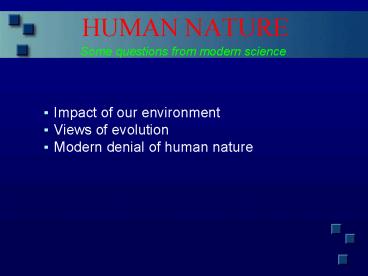HUMAN NATURE - PowerPoint PPT Presentation
1 / 18
Title:
HUMAN NATURE
Description:
... about the number of those who were rational - high quality, low quantity. During the Renaissance, people were seen as unique not just due to reason but ... – PowerPoint PPT presentation
Number of Views:1441
Avg rating:3.0/5.0
Title: HUMAN NATURE
1
HUMAN NATURE
- Some questions from modern science
- Impact of our environment
- Views of evolution
- Modern denial of human nature
2
HUMAN NATURE
What sets us apart as human?
- Certain physical characteristics
- Unique traits
- Invention ability
- Social and political actions
3
HUMAN NATURE
- What sets us apart as human?
- Consciousness of history
- Aesthetic appreciation
- Values
- Religion
4
HUMAN NATURE
- VIEWS ON HUMAN NATURE
RATIONAL VIEW What makes us different? The fact
that we are rational beings. PLATO - reason is
the highest part of the soul. STOICS - reason
pervades all things.
5
HUMAN NATURE
- Views of human nature
Many Greek Roman philosophers were optimistic
about the role of reason in human nature, BUT
pessimistic about the number of those who were
rational - high quality, low quantity. During
the Renaissance, people were seen as unique not
just due to reason but also due to their
relationship to God. The goal was to harmonize
theology and philosophy.
6
HUMAN NATURE
- Views of human nature
RELIGIOUS VIEWS - Judaism, Christianity,
Islam How do we know God? Natural
theology Revealed theology Experiential theology
7
HUMAN NATURE
- Views of human nature
JUDAISM Humans viewed in relation to God Bible
stresses freedom
8
HUMAN NATURE
- Views of human nature
CHRISTIANITY Spirit/flesh distinction Immortalit
y of the soul Jesus Christ key to relationship
with God Augustine - salvation only from
God Pelagius - human freedom to say yes or no
9
HUMAN NATURE
- Views of human nature
ISLAM - Humans the primary creation of
God. Perhaps more focus on Gods control than
human freedom. ALL THREE RELIGIONS Human
freedom is under submission in love to Gods
will. We serve God as individuals and also in
cooperation with others who love God as well.
10
HUMAN NATURE
- Views of human nature
ASIAN RELIGIONS - What makes us
different? HINDUISM - Humans must recover
eternal life. We seek the unchanging, the
permanent, the eternal. Brahman - Hindu
conception of God and of human nature source of
life, root of all existence. Our essence rises
over suffering and even death.
11
HUMAN NATURE
- Views of human nature
BUDDHISM - Begins with where we are and wants to
overcome the Four Noble Truths 1. Suffering
exists 2. Suffering is our fault - our
cravings 3. We can be freed frim suffering 4.
Take the Noble Eightfold Path Karma (cause and
effect) affects us all we will meet up with
dukkha (suffering). We suffer because we are all
attracted to the temporary.
12
HUMAN NATURE
- Views of human nature
CONFUCIANISM - initially optimistic. We could
all be a sage, but there arent very many.
Why? 1. People are profit-hungry 2. Lack of
respect, especially within families 3. Word and
action are not the same 4. We know nothing about
what the Sages taught 5. We do not do good to
and for each other The problem is how we misuse
free will. Is human nature good or bad?
Confucius does not not say.
13
HUMAN NATURE
- Views of human nature
HUMAN NATURE AND SOCIETY - What makes us
different? Beginning with the Renaissance,
philosophers began to struggle not just with how
humans were different were different from other
living beings, but also how we could improve
ourselves, grow even more human. Hobbes said WE
STINK, Rousseau said WE DIDNT.
14
HUMAN NATURE
- Views of human nature
Thomas Hobbes - Humans are selfish and mean, so
we need the state to control us. Hobbes might
approve of governments in China or North Korea
today. Social contract between government and
governed 0 selfish people agreeing not to kill
each other so they would not be killed
themselves. The state is in charge of
everything. Machiavelli - For our country, wrong
is right. Picard - There can be no justice as
long as laws are absolute.
15
HUMAN NATURE
- Views of human nature
Jacques Rousseau - very much the opposite of
Hobbes. People are naturally good - society
degrades them. The social contract - the state
works to make it possible for us to achieve the
exalted level we would have if there were no
state at all. Man is born free and he is
everywhere in chains. Rousseaus thought led to
the most liberal and revolutionary theories of
our day trust in the state to accomplish good
still abounds today.
16
HUMAN NATURE
- Views of human nature
SCIENTIFIC VIEWS OF HUMANS - What makes us
different? Biology says were just higher up the
food chain. Then, the scientific method began to
be applied to questions of human nature - social
sciences developed sociology, political science,
anthropology, psychology. One way psychology
examines human nature is BEHAVIORISM.
17
HUMAN NATURE
- Views of human nature
BEHAVIORISM - We can be shaped and formed like
any other animal. Darwin led to animal psychology
which led to behaviorism. Only what we can
observe is worth recording. B.F. Skinner - we
enter the world as a blank slate.
18
HUMAN NATUREVIEWS OF HUMAN NATURE
- Human behavior is changed
- 1. Pavlovian conditioning - we learn to react in
a certain way - 2. Operant modification - certain responses
reinforces positive behavior, removes negative
stimulus. - Humans DO NOT have an essential nature.































